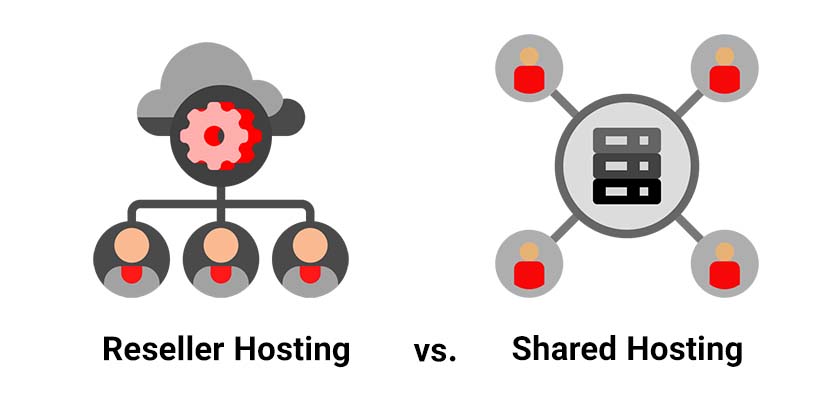
There is a huge increase in the number of companies that have moved to online platforms. Many websites are built each day, and online businesses are set up within a couple of hours. A lot of websites are designed using the WordPress CMS and start working on their businesses. It is important not to overlook web hosting because it allows you to make your website accessible to everyone.
You can keep your website’s information, including files and folders, online. There are a variety of web hosting options like shared VPS, reseller cloud, dedicated, WordPress hosting, etc. You can select one. If it’s a startup company, many opt for shared hosting because it’s cost-effective and is also controlled by the hosting company.
What if you wanted to create your own web hosting company? Surprised? Yes, you can begin your own web hosting company using reseller hosting. Additionally, if you’re an internet designer or developer, you could incorporate the web hosting services alongside other services you offer. This can give you an additional source of income. In this article, we would like to discuss reseller hosting vs. shared hosting. But first, let’s learn about them individually.
What Is Shared Hosting?
Shared hosting accounts generally have a single user for access to the hosting account and information. It is possible to connect multiple domains or websites onto the shared hosting account based on the plan you select; however, you will only need one login to access this hosting account. The additional domains or websites would be added as sub-domains, addon domains, or domains that are parked.
Shared hosting plans are generally the best choice for users who have a single website and business websites with a small number of visitors. When you add multiple websites to the shared hosting account, it’s important to know that the shared hosting account is allocated a specific amount of resources: CPU and Memory, Processes, etc. Each additional website is sharing these resources with other domains or websites you own on the same account.
There are two major disadvantages when you have multiple websites on the exact same account add-on domains, parked domains, or sub-domains, performance and security. In terms of performance, every website that is hosted within that “single” hosting account is required to share the resources that are available to each addon domain. This means that if you are hosting ten sites (and your account holds, for instance, two gigabytes of RAM), each site can be battling each other to get their portion of memory. With regards to security, if one of the add-on domains, sub-domains, or parked domains are compromised, it could possibly put the entire shared hosting account at risk as all of the sites are running under the same account. If there are multiple websites that are being utilized, we typically suggest hosting for resellers.
Advantages of Shared Hosting

1. The cPanel is User-Friendly
You can access an easy-to-use cPanel to control and make modifications to your hosting account. It also has several tools to manage your site builder, upload images and files, review your website’s statistics, create email accounts, and even add your website with an SSL Certificate.
2. Ability to Host Multiple Domains
There’s a popular misconception that you cannot host multiple websites on the same server. You can dispel that myth since you can also add other domains to the same server using the “Addon Domain” feature.
3. It’s Cost Efficient
Shared hosting is among the most affordable of the hosting choices. Therefore, choosing a shared server, if you think it’s the best option for your company, is a good fit for almost every budget.
4. It’s a Convenience
When you use shared hosting, the service providers handle your website on your behalf. This allows you to focus on the growth of your website and business.
Disadvantages of Shared Hosting
1. Downtime
If there are many users sharing a server, it could cause your website to move slow and cause an extensive amount of downtime. Hosting providers usually have measures in place to stop this. But, even a sudden increase in traffic to other websites that share a server with yours can slow it down.
2. Performance
When you host your site on shared hosting, anything that happens on another website on the server may impact your performance and uptime. An increase in traffic on the other website can result in your site slowing down. Websites that load slowly generally lose potential customers.
3. Security
Although service providers have software to secure your site, they are not able to guarantee 100% security. It is because there are multiple users sharing one server. If your site is hit by an attack, it could impact other websites on the server, and the reverse is true.
What Is Reseller Hosting?
Reseller hosting permits the user to use the control panel, known as “Web Host Manager” or “WHM” for short, to manage multiple cPanel hosting accounts. This is an excellent solution for people who have numerous websites, web designers and developers, or anyone who wants to sell hosting services. If you create multiple cPanel accounts, you’re effectively taking away certain performance and security issues mentioned above by separating your sites into their individual cPanel accounts. This means that each account is going to have its very own list of resources assigned to it, along with the username and password for each user account.
One of the benefits of having a reseller web hosting service is that you will have the following skills:
- Additional DNS Zone modification
- Ability to use nameservers that are private or branded
- Hosting Billing Software for Free Software for billing your hosting
- Free Domain Name Reselling
The most significant benefit of having the reseller plan is in a position to separate websites into separate cPanel accounts. This is the best option when managing several websites. This is particularly important when you intend to offer services to other businesses or companies and also if you intend to host websites for your clients.
Advantages of Reseller Hosting

- It’s a great method of earning a fair income without stressing about the management of servers. You only need to locate the most reliable web hosting reseller to help you set up your company.
- There is no cost to you as the package comes with all the costs associated with the maintenance of your server. If anything goes wrong on servers, then the web hosting provider will compensate for the damages.
- You can alter the themes and interface of the control panel for your client.
- There is no need to be a tech expert because the web hosting provider handles all technical aspects. In addition, it is free of charge.
Disadvantages of Reseller Hosting
- You’re dependent on the service provider you use because you have only limited access to their server.
- It’s not easy to switch your hosting provider as in order to do so; you’d need to transfer your customers’ information as well.
Reseller Hosting vs. Shared Hosting
Shared hosting is ideal for companies or people who need websites that don’t need many resources like bandwidth and RAM. It’s perfect for those who are a novice at web design because shared hosting companies do the heavy lifting by taking care of your site’s design and the overall administration of your website.
Reseller Web Hosting is ideal for freelancers entrepreneurs who have the expertise and a desire to learn about technology and commerce. The number of clients you can have is only limited by the amount of disk space you own.
The Difference between Reseller and Shared Hosting
The primary distinction between the reseller and shared hosting lies in their operation. The packages they offer differ in terms of the WHM (Web Host Management) panel.
In shared hosting, the resources that you’re given aren’t dedicated to you. You are likely to have to share the server with other people, and you’re not able to sell your account to an outside party. It’s ideal for low-traffic websites and small-scale businesses, but it won’t grant you total control over your server’s environment. It allows you to host unlimited domains, but you aren’t allowed to sell them.
Through Reseller Hosting, you have the option to purchase bandwidth and space and then sell it to your clients. You’re not allowed to manage or control the server where your account is located, but you have full control over the resellers you host through the master control panel. You can even argue that reseller hosting vs. affiliate is practically the same since you have the option to do exactly the same with your reseller hosting account. In addition, some people may throw in the dedicated server solution. So, let’s talk about reseller hosting vs. dedicated server.
Whilst it’s true with a dedicated server, you can install software and distribute different resources of your server and sell them to other people, and it can be quite a task if you aren’t an expert in handling a server on your own. This is where a hosting provider comes in place; by purchasing a reseller hosting package, you are only given the control panel, and you can allocate resources and sell them simply through a control panel rather than having to write queries and scripts or even install multiple software on a server to do it yourself. The same scenario can work for reseller hosting vs. VPS. A VPS is considered to be the higher end of shared hosting, and the resources that you purchase are dedicated to you and you alone and cannot be shared with other people through a platform where you can sell resources and create extra accounts for the said VPS.
Thus, in a simple manner with reseller hosting, it is possible to be a web host using your own brand name. You can begin selling business plans using your own branding and packages. Customers have control of their own personal cPanel account, and you manage them through the WHM panel separately.
Conclusion
Shared hosting is designed for one owner. Reselling is not permitted in shared hosting plans since it could negatively impact other users of the server. A single control panel is offered for all domains.
Reseller Hosting is intended for people who wish to sell hosting. Unlimitable control panel options are available with each customer account. If you require a large number of IP addresses as well as SSL certificates, you should consider the reseller hosting plan. A reseller hosting accounts offer Web Host Manager (WHM, Plesk panel ) and DNS control.










Leave a Reply